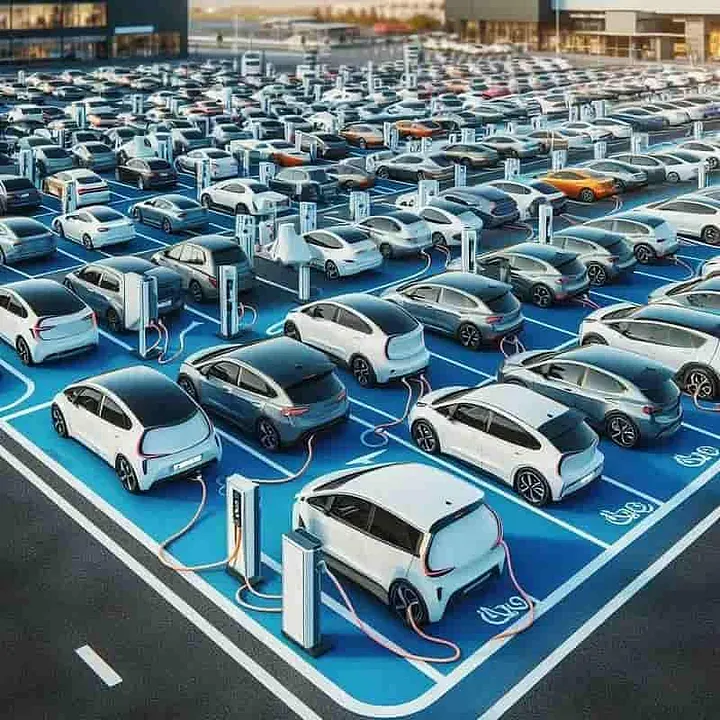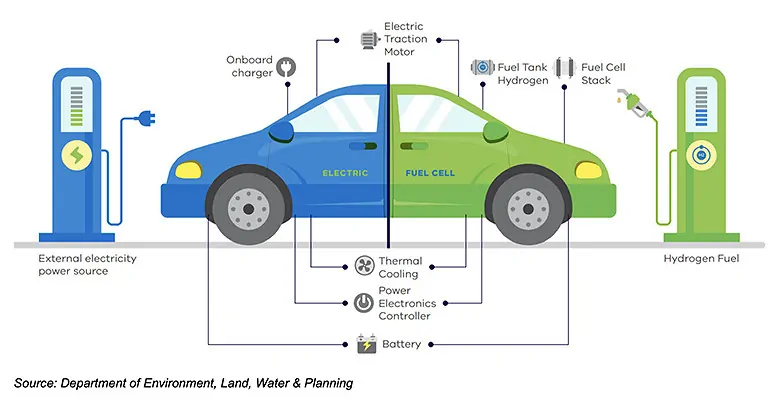Is This the Right Move?

The world is changing regarding the propulsion systems used for personal and commercial vehicles. Gas and Diesel powered cars and trucks are on the way out, while Electric motors powered by Batteries and Fuel Cells appear to be our future.
Battery powered electric vehicles are certainly more popular than hydrogen, mostly due to availability and cost, you see them everywhere. However, new hydrogen powered vehicles are being introduced by major manufacturers and may eventually become more popular as prices come down. Which method makes more sense?
Although both battery and hydrogen powered vehicles are environment friendly, replacing fossil fuel motors with electric, they both have their advantages and disadvantages. There are numerous reasons to support or dismiss each propulsion system, depending on your needs and desires. Here’s a list of a few pros and cons.
Battery Powered Electric Vehicles
Pros:
- Utilizing around 80% of the total energy to power the vehicle, battery powered electric cars are more efficient.
- Battery powered electric cars are currently more affordable than hydrogen operated vehicles.
- Choice, there are numerous more models available with battery-powered EVs.
- Battery powered electric cars accelerate quicker than both gas and hydrogen driven motors.
- You can charge your battery powered EV at home, at a recharging station, and at an increasing number of business locations.
Cons:
- Limited range and long charging times compared to the alternatives.
- Lithium-ion battery cells require about 19 dump trucks full of earth to manufacture one car battery, that’s a lot of digging. Lithium, like fossil fuels, is a limited resource.
- Lithium batteries have a history of spontaneous combustion and some manufacturers recommend you not park your vehicle in your garage as exploding lithium batteries have the potential to burn down your house.
- Adding a charging station to your garage can be expensive, the current average cost is between $1000 and $2500.
- Providing the infrastructure necessary for cross-country charging stations and home units is a costly venture that will take longer to establish and cost more than conversion to an all hydrogen system.
Hydrogen Powered Electric Vehicles
Pros:
- Quick refueling time of about 5 minutes, similar to the current fossil fuel experience.
- Longer driving distance between refueling stops than battery operated cars, again similar to or surpassing the current fossil fuel experience.
- A zero-emission vehicle that only emits water vapor.
- Hydrogen fuel cells will be 100% renewable.
- Eventually we will produce hydrogen fuel cells domestically with little to no greenhouse gas emissions, reducing the production impact on our environment and decreasing our reliance on foreign nations.
Cons:
- Fuel Cell Electric Vehicles (FCEV) are limited in production and temporarily restricted to States located in the West.
- Hydrogen fuel cells are even more expensive to replace than the already pricey lithium batteries.
- Although it is improving, the current process of refining hydrogen creates more greenhouse gases than generating electricity for EVs.
- At this time hydrogen vehicles are not as safe as EVs, which are not as safe as gasoline-fueled cars and trucks.
- Depending on the size of the fuel tank, hydrogen cars cost in the area of $100 to refill, while battery powered vehicles cost around $6-$10 to recharge.
At the time of this post, battery powered vehicles are the clear winner. EVs have been in production longer, offering a variety of designs at a lower cost, with access to charging stations across America.
Hydrogen powered cars currently offer fewer options in design, at a higher price and limited availability, while providing a refueling experience similar to the process we have been using for the last 100 years.
The choice is yours. Tough call!
Infrastructure
Is this the right move? I think the automobile manufacturers rushed the decision to go ahead with lithium battery technology. I believe Elon Musk and his introduction of the Tesla, before we had established the infrastructure to recharge these vehicles, has caused us to put the ‘cart before the horse’, prematurely determining the path we should take forward.
We should have debated the long term affect of both styles of propulsion, including the difficulties and expense of altering our infrastructure to adapt to this new technology. I believe the manufacturers jumped on the battery powered bandwagon, causing us to create an infrastructure that is more difficult to accomplish and much more expensive to build.
Imagine the idea of putting a charging station in every driveway in the United States, at about $1000 per installation. It will take years, if not decades, to accomplish this feat. I live in a high-rise apartment, we have 200 assigned parking spots. How do we get the wires and the meters to every single parking spot without a major overhaul, and at what cost?
Charging stations at every Hotel, Motel, Restaurant, Grocery Store, Mall, Ball Park, and almost every business that has customers and employees. The concept is mind-blowing. Are tax payers expected to pay for all of this with government subsidized installations? Did we think this through? Can we really afford this?

The Alternative Choice
Wouldn’t it be easier and cheaper to build an infrastructure that supports Hydrogen powered electric vehicles? To start with, we don’t need to put charging stations in every driveway in America, that’s a huge savings in time and money. All we need to do is slightly adjust our current 5-minute refueling system, by using gas stations that are already in place.
Yes, switching out the underground gas storage tanks to hydrogen storage tanks at every gas station will still take time and money. However, the expense of switching storage tanks will take less time and save money compared to putting up EV charging stations pretty much everywhere.
Using the ‘gas stations’ as locations for hydrogen refueling centers would be an easier adjustment for the consumer, as the process would be similar to the current gas-car refueling situation. A five minute ‘pit-stop’ every week or two rather than the time-consuming charging method used for battery-powered EVs.
Hydrogen fuel cells, once the technology is perfected, would be the easiest, least expensive, and most ‘consumer-friendly’ way to move forward toward zero-emissions transportation. I believe years from now we will need to adjust the system anyway, lithium, like fossil fuels, is a limited fuel source. We need a long-term solution to our current dirty technology.
On Reflection:
I fear we have made a mistake by pushing battery powered technology over hydrogen, and the change to electric motor vehicles will, in the end, eventually cost more than it should have. There may still be time to change our direction.
The continuous, quick-paced improvements in hydrogen technology, model production, and safety concerns should allow us time to compare both methods of achieving zero-tolerance transportation. Who will be declared the winner? The race is on.
Update 8/21/24:
NPR Business Headline: “Ford scraps all-electric SUV plan, saying drivers want hybrids”. That didn’t take long. In less than a month after this article was written Ford made the announcement they were going to focus on hybrid vehicles instead of producing an all-electric lithium battery three-row SUV.
Hybrid vehicles are less expensive to produce than 100% battery operated SUVs and fulfill the needs of the consumers who desire the option of using gasoline. According the NPR, “Ford will keep selling its current fully electric vehicles — the Mustang Mach-E and the F-150 Lightning pickup, along with commercial vans.”
Thanks for reading my article.
Info Sources: In addition to my personal experience, most ‘researched’ information was gathered from the websites noted below and from various Google searches.
- Learn more about how Electric Cars work, visit the official website for Bacancy here.
- To visit the official Edmunds Auto website go here.
- Learn more about Hydrogen-Powered Vehicles from The Guardian here.
- *Public Domain WikiMedia image used with permission via Creative Commons License BY-SA 3.0 Deed and/or BY-SA 4.0 Deed





Leave a Reply